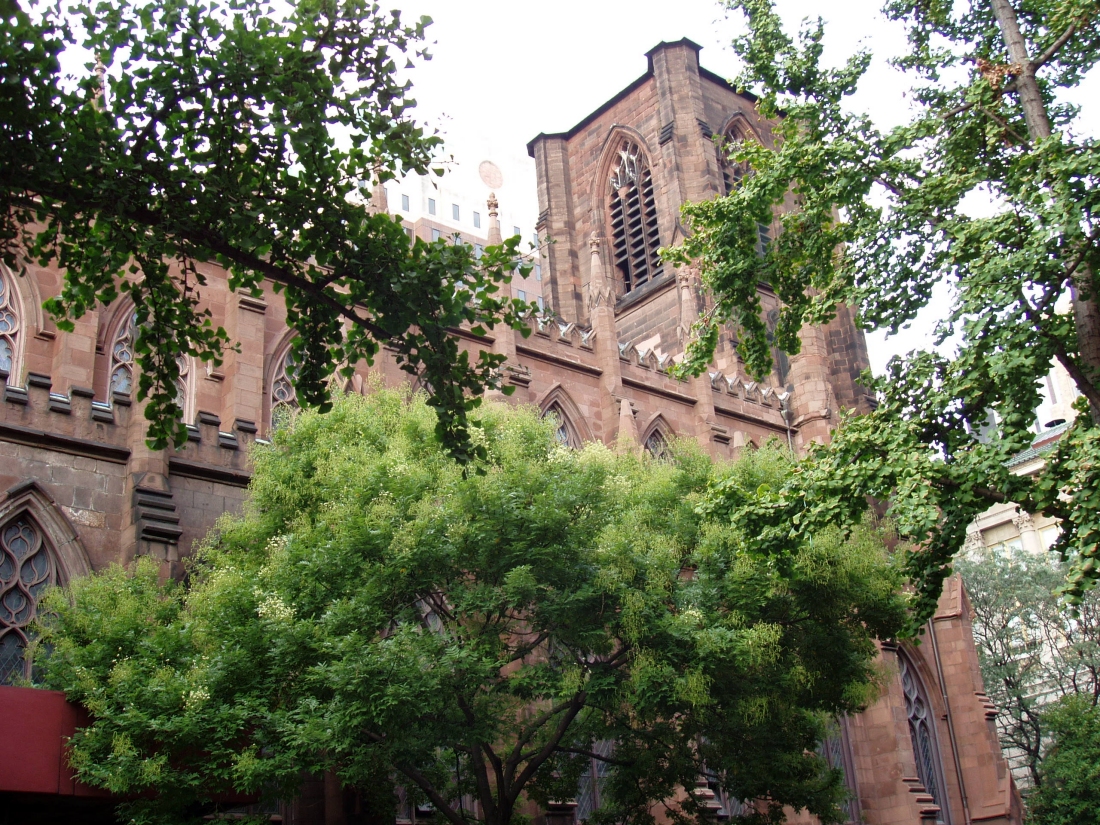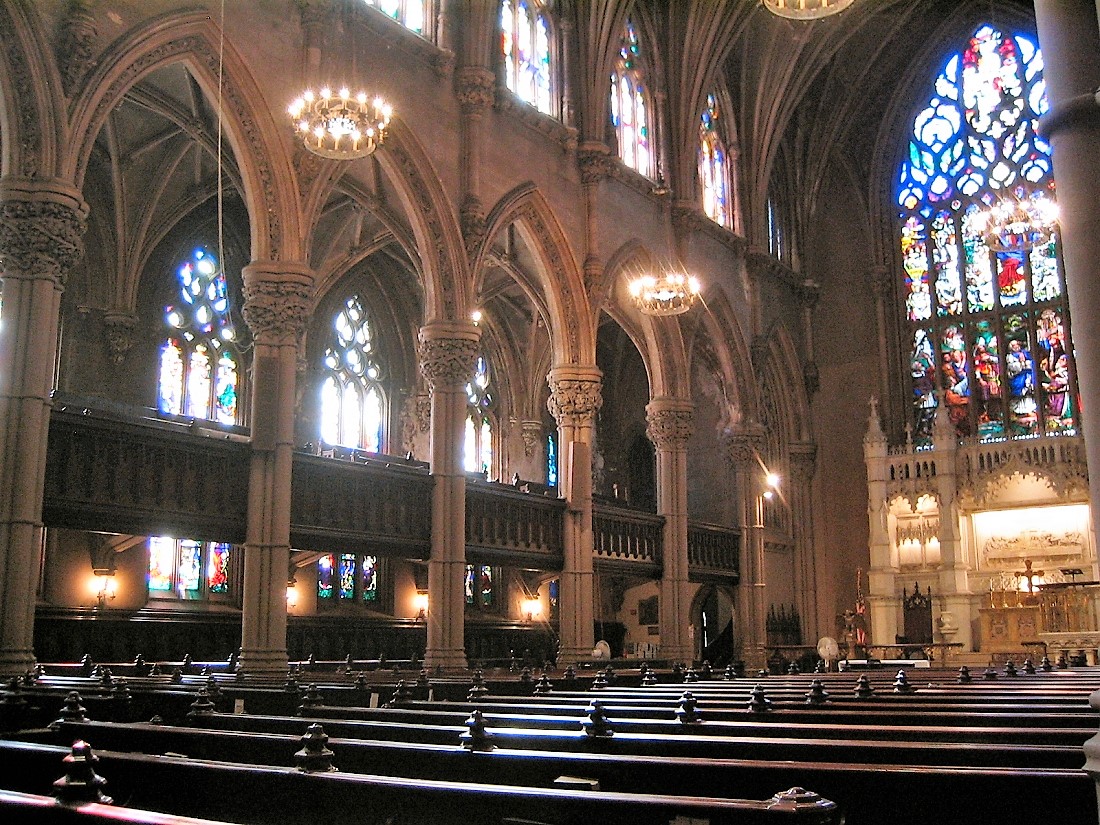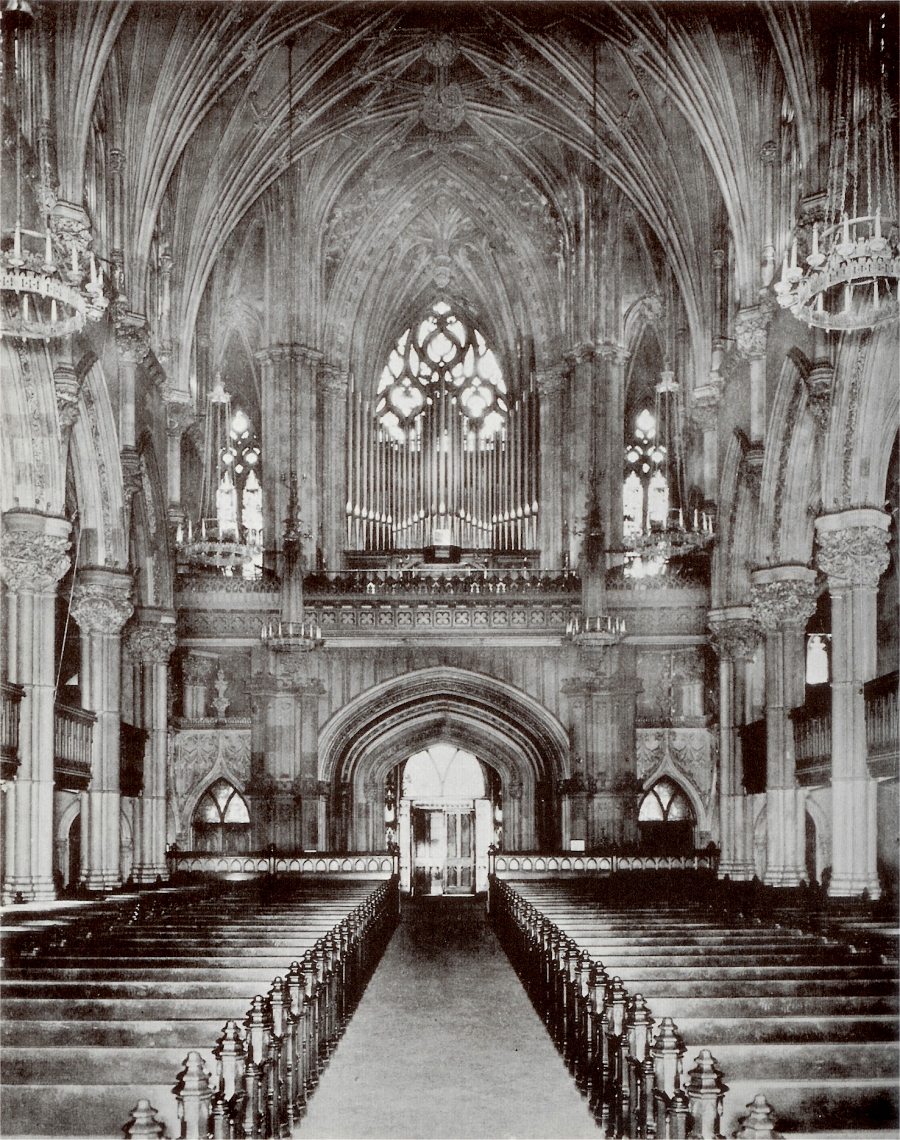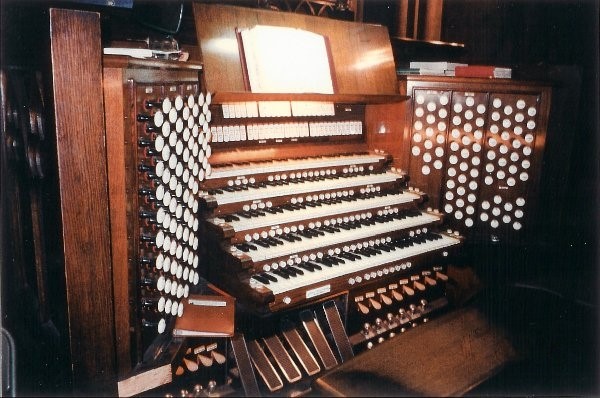Holy Trinity Episcopal Church / St. Ann & the Holy Trinity Episcopal Church
157 Montague at Clinton
New York City: Brooklyn, NY
Images
 2010-09-09 - Church exterior (Photograph by Steven E. Lawson via the NYC AGO Organ Project, submitted by Jeff Scofield/Jeff Scofield)
2010-09-09 - Church exterior (Photograph by Steven E. Lawson via the NYC AGO Organ Project, submitted by Jeff Scofield/Jeff Scofield) 2010-09-09 - Church interior to front, stained glass windows (Photograph by Steven E. Lawson via the NYC AGO Organ Project, submitted by Jeff Scofield/Jeff Scofield)
2010-09-09 - Church interior to front, stained glass windows (Photograph by Steven E. Lawson via the NYC AGO Organ Project, submitted by Jeff Scofield/Jeff Scofield) 1925 - Church interior to rear and organ case (Photograph from an archival source: Skinner Organ Co. via the NYC AGO NYC Organ Project, submitted by Jeff Scofield/Jeff Scofield)
1925 - Church interior to rear and organ case (Photograph from an archival source: Skinner Organ Co. via the NYC AGO NYC Organ Project, submitted by Jeff Scofield/Jeff Scofield) 1996-07-03 - 1968 Console (Photograph by Jeff Scofield via the NYC AGO NYC Organ Project/Jeff Scofield)
1996-07-03 - 1968 Console (Photograph by Jeff Scofield via the NYC AGO NYC Organ Project/Jeff Scofield)
Consoles
Main
- Organ type: Traditional With Roll Top
- Console position: Console in Fixed Position, Center
- 4 manuals
- 57 stops
- 68 registers
- Key action Type: Electrical
- Stop action Type: Electrical
- Stop layout Type: Drawknobs in Vertical Rows on Angled Jambs
- Manual compass: 61 notes
- Pedal compass: 32 notes
- Pedal Type: Concave Radiating (Meeting AGO Standards)
- Expression Type: Balanced Expression Shoes/Pedals (Meeting AGO Standards)
- Has crescendo
- Combination action: Adjustable Combination Pistons
- Has combination thumb pistons
- Has combination toe pistons
- Has coupler thumb pistons
- Has coupler toe pistons
- Has tutti thumb pistons
- Has tutti toe pistons
Notes
2004-10-30 - Building formerly that of Holy Trinity Episcopal. 5 manual Keates console added in 1968. Alterations by Farrell and Van Zoeren. -Database Manager
2006-03-06 - Updated through information adapted from <i>E. M. Skinner/Aeolian-Skinner Opus List</i>, by Sand Lawn and Allen Kinzey (Organ Historical Society, 1997), and included here through the kind permission of Sand Lawn: <br><i>Replaced #142; organ extant; five manual Keates console installed in 1968; considerable alterations by Farrell and Van Zoeren.</i> -Database Manager
2020-11-20 - From the NYC AGO NYC Organ Project: The Protestant Episcopal Church of the Holy Trinity in Brooklyn Heights was designed by Minard Lafever (1798-1854) and completed in 1848. Lafever's design is considered one of the finest masterpieces of the Gothic Revival style in America. The church's elaborate interior features a soaring nave highlighted by lierne vaulting which employs wood-frame plaster vaults. More than 7000 square feet of stained glass by William Jay Bolton depict the "Jesse Tree" of Christ’s ancestry; this astounding collection is perhaps the most significant early American stained glass installation. Bolton’s organ loft window is on permanent exhibition in the American Wing of the Metropolitan Museum of Art.
A clash between the bishop and rival factions within the parish led to the closure and dissolution, in 1959, of Holy Trinity Church. In 1969, St. Ann's Church, faced with a crumbling building only a few blocks away, moved into the former Holy Trinity Church, resulting in the present name of St. Ann and the Holy Trinity. At this time, the E.M. Skinner organ was modified, and a new five-manual console was installed with Virgil Fox as the consultant. In 1979, the New York Landmarks Conservancy intervened to save the aging church and stained glass, and in 1983 the St. Ann Center for Restoration and the Arts was founded. The center’s record of success included the restoration of the chancel window, 64 stained glass windows by William Bolton in the nave (considered the earliest of their type in America), and the exterior fence. With support from World Monuments Fund, a conditions survey was carried out and matching funds were made available from the New York State Bond Act to restore the roof. Today the church is open for services and restoration efforts are moving ahead. St Ann's is also seeking to make the property more self-sustaining through the sensitive development of its adjacent Parish Hall.
In 1968, the Skinner organ was altered and enlarged by Tom Farrell of Brooklyn. A new five-manual drawknob console was built by the Keates-Geissler Pipe Organ Company of Acton, Ontario, Canada, and installed in 1970. The Keates console had drawknobs that were engraved with an Old English font, and included preparations for many additions. Since that time, the organ has undergone extensive physical and tonal restorative work as funding allowed. Stops that had been loudened were returned to their original volume. In 2003, the Solo division was completely restored and the Tuba Mirabilis, which had been moved to a horizontal position atop the Solo box, was repaired and returned to its original location. The console was rebuilt by John Randolph in 2005, and the Swell reeds were restored by Chris Broome in 2010. The Organ Historical Society awarded its distinguished Historical Citation No. 240 in recognition of the Skinner Organ as an outstanding example of organbuilding and worthy of preservation. -Jeff Scofield
Stoplist
Typed stoplist Source: From Allen Kinzey Date not recorded
Brooklyn, New York
Church of the Holy Trinity, Episcopal
Skinner Organ Company Opus 524 1925 4 manuals, 57 stops, 64 ranks
___________________________________________________________________________
GREAT ORGAN SWELL ORGAN
16' Diapason 61 16' Bourdon 73
16' Bourdon 61 8' Diapason 73
8' First Diapason 61 8' Gedeckt 73
8' Second Diapason 61 8' Hohl Flute 73
8' Claribel Flute 61 8' Quintadena 73
8' Wald Flute 61 8' Salicional 73
8' Viola Dolce 61 8' Voix Celeste 73
8' Erzähler 61 8' Flauto Dolce 73
4' Octave 61 8' Flute Celeste (TC) 61
4' Flute 61 4' Flute Triangulaire 73
2' Fifteenth 61 4' Gemshorn 73
IV Mixture 244 2' Flautino 61
8' Trumpet 61 V Mixture 305
Chimes EC 16' Posaune 73
8' Cornopean 73
CHOIR ORGAN 8' Corno d'Amore 73
16' Gamba 73 8' Vox Humana 73
8' Diapason 73 4' Clarion 73
8' Concert Flute 73 Tremolo
8' Dulciana 73
8' Unda Maris (TC) 61 PEDAL ORGAN
8' Viole d'Amour 73 32' Bourdon 12
4' Flute 73 16' Diapason 32
2 2/3' Nazard 61 16' Violone 32
2' Piccolo 61 16' Bourdon 32
1 3/5' Tierce 61 16' Echo Bourdon SW
8' English Horn 73 16' Gamba CH
8' Clarinet 73 10 2/3' Quint (Bourdon) --
Tremolo 8' Octave 12
8' Harp (TC) -- 8' Gedeckt 12
4' Celesta 61 bars 8' Still Gedeckt SW
4' Stopped Flute 12
SOLO and ECHO ORGANS 32' Bombarde (wood) 12
8' Gross Gedeckt 73 16' Trombone 32
8' Gross Gamba 73 16' Posaune SW
8' Gamba Celeste 73 8' Tromba 12
4' Orchestral Flute 73 Chimes EC
8' Tuba Mirabilis 73 (20" wp)
8' French Horn 73
8' Chimney Flute 73
8' Muted Viole 73
4' Silverette 73
8' Vox Humana 61
Tremolo (both)
Chimes 20 tubes
[Received from Steven E. Lawson 2017-03-05]
Websites
Related Pipe Organ Database Entries
Other Links
Regrettably, it is not possible to display the information about the sponsor of this pipeorgandatabase entry or if there is a sponsor. Please see About Sponsors on Pipe Organ Database.



